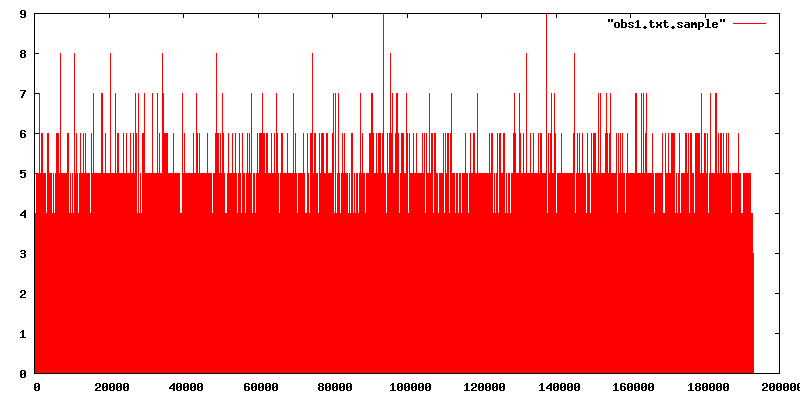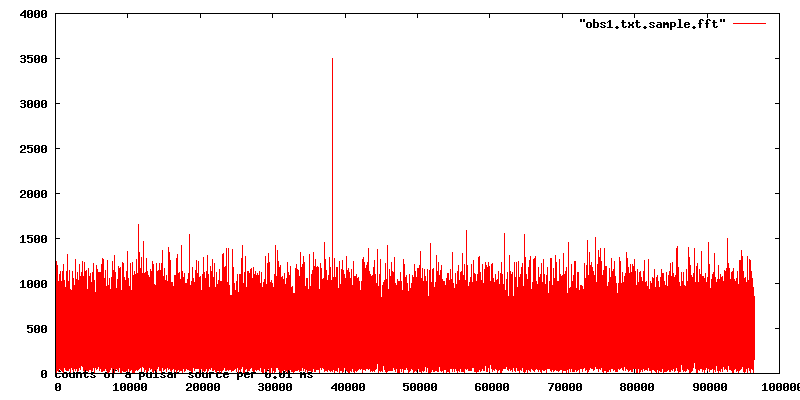- Posts: 3663
- Thank you received: 2
FFTW
- voyager
- Offline
- Super Giant
-

Less
More
18 years 6 months ago #33419
by voyager
My Home Page - www.bartbusschots.ie
Replied by voyager on topic Re: FFTW
Hmm .... FFT was never my strong point ..... code is .... so I was rather hopping this would be a code question but since it's a maths question that's me right out of my league ... sorry Al!
Bart.
Bart.
My Home Page - www.bartbusschots.ie
Please Log in or Create an account to join the conversation.
- jeyjey
- Offline
- Red Giant
-

Less
More
- Posts: 757
- Thank you received: 10
18 years 6 months ago #33515
by jeyjey
Nikon 18x70s / UA Millennium Colorado:
Solarscope SF70 / TV Pronto / AP400QMD Coronado SolarMax40 DS / Bogen 055+3130
APM MC1610 / Tak FC-125 / AP1200GTO Tak Mewlon 250 / AP600EGTO
Replied by jeyjey on topic Re: FFTW
Al --
A DFT is reversible; therefore it must also encode the amplitude of each frequency component (as well as its phase). I'm nearly a complete neophyte on FFTs, so you'll have to take this with a grain of salt -- but I think your results are the nature of the beast.
-- Jeff.
A DFT is reversible; therefore it must also encode the amplitude of each frequency component (as well as its phase). I'm nearly a complete neophyte on FFTs, so you'll have to take this with a grain of salt -- but I think your results are the nature of the beast.
-- Jeff.
Nikon 18x70s / UA Millennium Colorado:
Solarscope SF70 / TV Pronto / AP400QMD Coronado SolarMax40 DS / Bogen 055+3130
APM MC1610 / Tak FC-125 / AP1200GTO Tak Mewlon 250 / AP600EGTO
Please Log in or Create an account to join the conversation.
- albertw
- Topic Author
- Offline
- IFAS Secretary
-

Less
More
- Posts: 4173
- Thank you received: 181
18 years 6 months ago #33731
by albertw
Albert White MSc FRAS
Chairperson, International Dark Sky Association - Irish Section
www.darksky.ie/
Replied by albertw on topic Re: FFTW
Hi,
ok I was a bit off
The inputs are real alright, however the output array is complex, a+ib. To plot the output array you plot the magnitude of the value sqrt(a*a+b*b).
Now wheres that pulsar? :lol:
ok I was a bit off
The inputs are real alright, however the output array is complex, a+ib. To plot the output array you plot the magnitude of the value sqrt(a*a+b*b).
Now wheres that pulsar? :lol:
Albert White MSc FRAS
Chairperson, International Dark Sky Association - Irish Section
www.darksky.ie/
Please Log in or Create an account to join the conversation.
- dmcdona
- Offline
- Administrator
-

Less
More
- Posts: 4557
- Thank you received: 76
18 years 6 months ago #33735
by dmcdona
Replied by dmcdona on topic Re: FFTW
I was just going to post that Al!
Please Log in or Create an account to join the conversation.
- albertw
- Topic Author
- Offline
- IFAS Secretary
-

Less
More
- Posts: 4173
- Thank you received: 181
18 years 6 months ago #33738
by albertw
Guess the telapathy worked better
Albert White MSc FRAS
Chairperson, International Dark Sky Association - Irish Section
www.darksky.ie/
Replied by albertw on topic Re: FFTW
I was just going to post that Al!
Guess the telapathy worked better
Albert White MSc FRAS
Chairperson, International Dark Sky Association - Irish Section
www.darksky.ie/
Please Log in or Create an account to join the conversation.
- albertw
- Topic Author
- Offline
- IFAS Secretary
-

Less
More
- Posts: 4173
- Thank you received: 181
18 years 6 months ago #33799
by albertw
Albert White MSc FRAS
Chairperson, International Dark Sky Association - Irish Section
www.darksky.ie/
Replied by albertw on topic Re: FFTW
Hi,
Just to let you know that there was a point to this topic!
Say you have some data from RXTE, which consists of the exact timing (to tens of microseconds) of when photons are detected from a pulsar (plus noise, ambient light etc.). Now split all this into 'bins' of 0.01s, so we are counting the number of photons that arrive in a sequence of 0.01 seconds. The plot of that looks like this:
So we get between 0 and 9 counts per sample. Great but it doesn't even look like there is a pattern in there. Now we put that through the fft transform which will show us what frequencies are in there:
Now something looks obvious! The peak is at 38245, which means that it has 38245 cycles during out timespan, which equates to a source with a frequency of 19.814792 Hz
By looking at later observations to see how the pulsar frequency has changed we can work out the age and magnetic field of the object.
Cheers,
~Al
Just to let you know that there was a point to this topic!
Say you have some data from RXTE, which consists of the exact timing (to tens of microseconds) of when photons are detected from a pulsar (plus noise, ambient light etc.). Now split all this into 'bins' of 0.01s, so we are counting the number of photons that arrive in a sequence of 0.01 seconds. The plot of that looks like this:
So we get between 0 and 9 counts per sample. Great but it doesn't even look like there is a pattern in there. Now we put that through the fft transform which will show us what frequencies are in there:
Now something looks obvious! The peak is at 38245, which means that it has 38245 cycles during out timespan, which equates to a source with a frequency of 19.814792 Hz
By looking at later observations to see how the pulsar frequency has changed we can work out the age and magnetic field of the object.
Cheers,
~Al
Albert White MSc FRAS
Chairperson, International Dark Sky Association - Irish Section
www.darksky.ie/
Please Log in or Create an account to join the conversation.
Time to create page: 0.111 seconds





